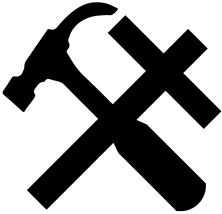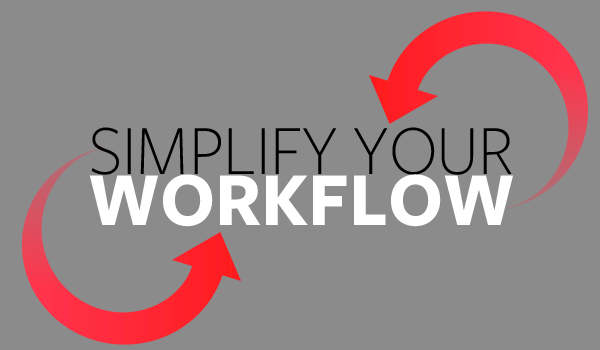As our working world shifts from assembly lines and manual labor to a knowledge economy where we get paid for ideas instead of physical tasks, there’s an increasing likelihood you’ll be taking your work home with you.
When you work on an assembly line, there’s not a whole lot you can do after hours. You might think about how you can process pieces faster or ways to be more efficient in your role, but you’re not lugging home a press, conveyor belt or pneumatic drill. Work is at work. When you arrive home, work is no longer part of the equation.
If you’re in a career that involves anything interpersonal, any requirement to use email, or deadlines in general you probably don’t get to leave work at work.
The boundaries between work and your personal life blur together into a hazy oblivion.
That’s not necessarily a bad thing. No, don’t let work get in the way of the most important things in life, but if you really love your work, bringing it home can be good (and even enjoyable).

Here’s the main issue between the lines of work and life blurring together: when are you finished? I’m trying to answer that myself.
When is Our Work Done?
It can feel like our jobs are never complete. Unfinishable. Completely void of any clear ending. That’s tough. It’s especially difficult in a profession where your “work” is people–like in ministry.
When am I done? Is it when someone decides to follow Jesus? When they follow Jesus more closely? When they help others follow Jesus?
Is it when I’ve talked with my “quota” of students for the day? If I’ve been on campus for 8 hours? If I have an empty inbox? Is it if I’ve spent extra time with a student or responded to an emergency or completed a graphic for an event?
No, of course not. At the same time, yes, of course. Some of these things are the goals we’re working toward. It’s messy.
When you sign up to help people as your profession, you don’t have projects, you have interactions. It’s not all deadlines, sometimes it’s being a life line.
Some days being successful in your work means you meet one of your friends–a student you work with–at midnight after his brother’s face caught on fire taking a flaming shot that he didn’t blow out (this is college ministry, after all). Some days that means being rejected by everyone you approach to talk about spiritual things and just knowing you’re going to have those days.
Some days it means doing all you can to be faithful, and finding joy in the completion of a simple task because nothing else in your life is finished.
One answer to when our work is done: when we’ve finished what we can finish, we’ve taken steps toward reaching goals, and we haven’t let the things we can’t control stop us from doing the things we can control.
Let’s break that down.
How Can I Feel Like I Did Anything that Matters?
1. Set priorities based on vision.
I can’t give you a perfect map for what doing good work looks like. But I can say this: let your organization’s vision help you set priorities for what you’re doing and how you’re spending your time.
2. Understand peaks and valleys.
Some seasons of work will be busier than others. Understand the flow of your work, and do what you can to prepare yourself, your family, and your tasks according to your busier seasons.
3. Draw a deep pit in the sand.
Don’t let your work overtake your life. A line in the sand can easily be moved, but a pit means you can’t cross it. Set boundaries for working at home (like you’ll always have dinner with your family, you won’t work between 5pm – 9pm, you’ll always be in bed by 11pm–whatever you need to do).
4. Focus on the right inputs.
You can’t always control outcomes, but you can control what you’re doing to create those outcomes. Tweak, adjust, and correct the things you’re doing on the front-end when what you’re hoping will happen isn’t happening.
Humans are irrational and irresponsible. We do things that are unwise and confusing to the people we work with. You can’t control that. Don’t let the response of others keep you from doing what you need to do to carry out your work.
5. Work backwards.
If you’re planning an event and trying to get 50 people to your event, and you’re only inviting 40, well, you’re not going to have 50 people. Try to calculate how much it takes to get to where you want to go, and start calculating from there what it will take to get to 50 people.
If you want 50 people, and you know normally 25% of people accept your invitation, you need to invite 200 people. Now, you need to find those 200 people, so figure out how you’re meeting people (online or in person) and take tangible steps to get to 200, which hopefully leads to 50 attendees.
6. Evaluate and refine.
For some of our work, we won’t know if we’ve done great work until we’ve finished. That means ruthlessly evaluating what happened as a result of our work and adjusting things for the next time around.
7. Don’t put your worth in total completion.
There will always be more work to do. More calls to make, more emails to write and more tasks to check off. Do the most important things today, and then do the next most important things tomorrow. You won’t always be able to wrap a bow around your work with a sense of completion, even though that’s likely what you’re working toward when it comes to projects.
8. If you need to finish something, do the dishes.
If you worked on things all day and nothing is complete, take a simple home task like doing the dishes or making dinner, do it all the way, and rejoice that something in your life is actually complete.
The Reality
We’re not moving back to a world where you punch your ticket at the end of the day because robots are taking those jobs (and robots need to eat too, you guys). Your boss can’t always be looking over your shoulder, and you can fall into the ditches of laziness or becoming a workaholic which run parallel to the road of work that matters.
Embrace ambiguity and unfishedness. Ship, complete what you can, and enjoy the task of throwing away receipts that you don’t need any more when you need something tangible to cross off your check list.
Learn, adjust, adapt. Perfect your craft, but know that your craft may never be finished.
Rest easy, friends, there’s more work to do.
Question: How do you deal with your work that’s never finished?
Photo provided by cynthiab





